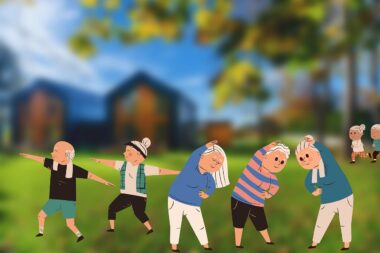Dealing with Fatigue: Energy Management for Senior Fitness Enthusiasts
Fatigue is a common challenge faced by many seniors who are enthusiastic about maintaining their fitness. This can be especially true when trying to keep up with various physical activities and exercises. Understanding the nature of fatigue is crucial for seniors as they navigate their fitness journey. It’s important to recognize that fatigue can be influenced by multiple factors, including age, health conditions, and lifestyle choices. To combat fatigue, seniors can focus on several key energy management strategies. Maintaining a balanced diet that includes plenty of fruits, vegetables, lean proteins, and whole grains can provide essential nutrients and energy. Staying hydrated is another crucial aspect that is often overlooked but can significantly impact energy levels. Regular health check-ups will help detect any underlying issues that may contribute to fatigue. Finally, Setting realistic fitness goals is vital. Seniors should listen to their bodies and modify their activities as necessary to avoid overextending themselves, which can lead to increased fatigue. Moreover, using relaxation techniques like deep breathing can also help to recharge energy levels during tiring activities.
One of the most important aspects of energy management for seniors is understanding the importance of rest and recovery. The body undergoes numerous changes as it ages, and the muscles may take longer to recover after exertion. Scheduling in rest days within an exercise routine allows the muscles to repair and rebuild effectively. Moreover, integrating low-impact exercises such as walking, swimming, or yoga can alleviate fatigue while still promoting fitness. These exercises can improve circulation and flexibility without causing excessive strain. Another helpful method for managing energy is to establish a consistent daily routine that includes physical activity. If seniors practice their routines at similar times each day, their bodies may gradually become accustomed to the exertion and recover more quickly. Additionally, it’s essential to stay mentally engaged. Activities that stimulate the brain, such as puzzles or social interaction, can boost overall energy levels. Many seniors may also benefit from incorporating energy-boosting snacks into their diets, such as nuts or yogurt, which can provide much-needed fuel between meals. Listening to one’s body is essential to prevent burnout.
Social Engagement and Its Impact on Fitness
Social interaction can significantly boost energy levels and combat feelings of fatigue. Engaging in fitness activities with a friend or joining a senior fitness group can make workouts more enjoyable and motivating. This social aspect creates a fun atmosphere that encourages commitment to exercise regimens. Moreover, sharing fitness experiences and challenges can provide emotional support, which is tremendously beneficial in maintaining enthusiasm for fitness. Maintaining social relationships can have positive effects on mental health as well. Seniors who stay socially engaged often report higher levels of satisfaction and overall well-being. Furthermore, participating in group activities allows for the exchange of tips and strategies for overcoming fatigue. Additionally, attending regular classes or workshops presents opportunities to learn new exercises tailored to seniors, ensuring the activities remain interesting. Community centers often host free or low-cost fitness classes designed specifically for older adults. This setting helps foster a sense of belonging while improving individual health outcomes. Physical and social engagement can create a powerful synergy that empowers seniors to face difficulties with greater resilience and positivity.
Proper sleep is a crucial factor in energy management and overall health for seniors. Age-related changes often lead to alterations in sleep patterns, which can worsen fatigue. Seniors should prioritize good sleep hygiene to improve sleep quality. This may involve setting a consistent bedtime, having a relaxing pre-sleep routine, and ensuring the bedroom environment is conducive to sleep. Limiting exposure to screens before bed and avoiding heavy meals can also enhance sleep quality. Furthermore, exploring relaxation techniques, such as meditation or gentle stretching, before bedtime can help calm the mind and prepare the body for restful sleep. Interestingly, some seniors may find that short naps during the day help rejuvenate energy levels. However, it’s essential to keep these naps brief to avoid disrupting nighttime sleep. Expressing concerns related to sleep with healthcare providers can lead to specific solutions tailored to individual needs. Effective management of sleep patterns contributes substantially to reducing fatigue. By committing to sleep improvement, seniors can make significant strides in their overall fitness journey, leading to meaningful enhancements in their quality of life.
Nutrition and Energy Levels
The role of nutrition cannot be understated when it comes to managing fatigue in seniors. A well-balanced diet directly influences energy levels and overall health status. Seniors should focus on consuming nutrient-dense foods that provide sustained energy throughout the day. Emphasizing foods rich in complex carbohydrates, such as whole grains, can help maintain stable energy levels. Additionally, incorporating healthy fats, like those found in avocados and nuts, supports energy and nutrient absorption. Proteins are also essential, as they serve to repair muscles and tissues, which is critical after workouts. Portion control is a vital aspect of nutrition. Eating smaller, more frequent meals can help in preventing energy dips that frequently accompany large meals. Furthermore, seniors should be mindful of their vitamin and mineral intake, particularly B vitamins and iron, which play significant roles in energy production. Supplementation may be necessary for some individuals, but it should always be discussed with healthcare professionals. Maintaining healthy eating habits along with regular physical activity forms the foundation for effective energy management.
Understanding individual limits is essential for effective energy management, particularly when dealing with fatigue. Seniors should engage in targeted fitness assessments to identify their functional levels and tailor activities accordingly. Consulting with fitness professionals or physical therapists can provide valuable insights into safe exercise recommendations based on personal health status and fitness goals. Activities that focus on balance, flexibility, and strength development are vital in promoting sustainable energy levels as they increase body efficiency. Recognizing the body’s signals also aids in avoiding overtraining and related fatigue. Planning workouts that alternate intensities will help to maintain energy levels over time. Moreover, developing a workout buddy system can provide extra motivation. The support and companionship offer a much-needed encouragement—participants can help keep each other accountable. If fatigue sets in, adjustments to the activity level can be discussed together—striking a balance between maintaining fitness and respecting personal limits is critical. Having open discussions about energy levels can lead to better understanding and improved management strategies that benefit older adults engaged in fitness efforts.
Conclusion: Embracing Healthy Aging
In summary, managing fatigue is essential for seniors who wish to maintain an active and fulfilling lifestyle. Emphasizing the importance of proper nutrition, effective sleep, social engagement, and realistic fitness goals will contribute to a positive, energy-boosting experience. Understanding the individual needs of each senior and incorporating strategies that work best for them will enhance their commitment to fitness. Embracing a holistic approach to health ensures a more significant chance of success in overcoming fatigue. By integrating these methods into daily routines, seniors can cultivate a happier, more energetic life. Seniors are encouraged to celebrate their achievements, whether big or small, as every step forward is significant in their fitness journey. Having supportive community resources, such as classes and groups, further enhances their experience and contributes positively to their health. Seniors can inspire others to engage in fitness regardless of age by sharing their experiences overcoming fatigue. Healthy aging should be viewed as a continuous learning process, where individuals grow and adapt to their bodies’ changing needs over time. Ultimately, managing fatigue will promote improved quality of life and well-being.
By adopting a proactive mindset, seniors can successfully deal with fatigue in their fitness endeavors. Each step taken towards managing energy levels promotes a sense of accomplishment, emphasizing the importance of health and fitness during the golden years. Additionally, seniors can discover new passions through various activities that engage both body and mind, making fitness a chance for exploration rather than a chore. Adequate energy management allows seniors to participate fully in social functions, family gatherings, and community events, enhancing their engagement in life. Overall, every effort counts towards achieving a more vibrant and fulfilling senior lifestyle by embracing fitness challenges and finding innovative ways to manage fatigue effectively.





